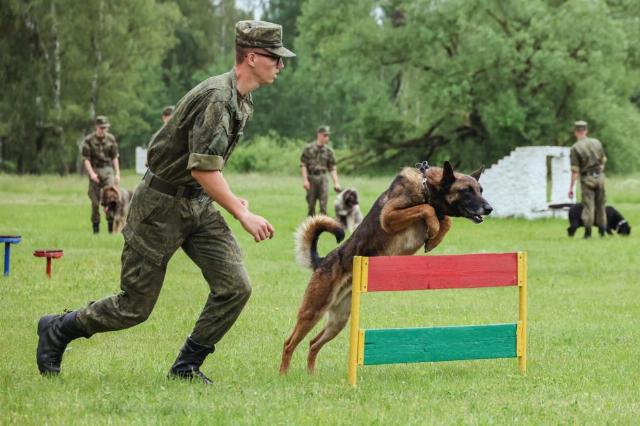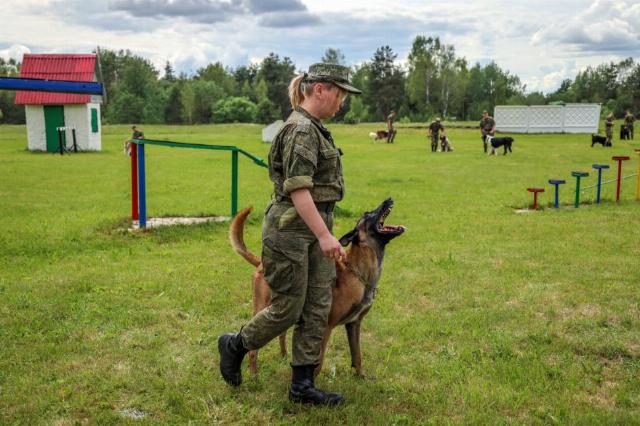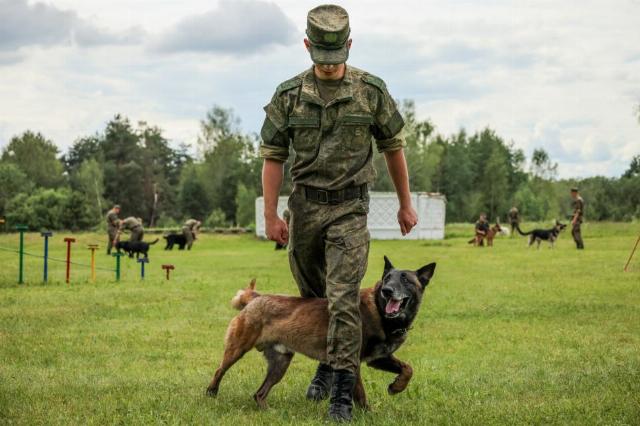For thousands of years, the dog has been man's most loyal friend. And even in the age of high technology and artificial intelligence, quadrupeds continue to walk side by side with humans, helping them in a variety of fields. In an interview with TASS, Senior Lieutenant Vladimir Zherdev, a specialist at the 470th Training Center of the Russian Armed Forces, commander of a training platoon training dogs of the mine search service, spoke about the value of dog handlers and their charges and how modern conflicts have changed the tasks performed by four-legged dogs.
— How necessary is it now to train both dog handlers and service dogs who specialize in mine detection? Considering the number of technical innovations that exist and which are increasing every day.
— The task of an explosives specialist dog handler is to find what an engineer specialist could not find.
First of all, engineers come in, inspect the territory, visually and with the help of their devices. But not all devices can recognize plastic with explosives or just a pure substance. Plastid, TNT — there are no metal objects there. Except by sniffing, smelling, or eye contact, it is practically undetectable or very difficult to do so.
Dogs have thousands of times more receptors, they are very sensitive, much more sensitive than humans. And in connection with the special military operation (SVO), of course, a huge number of specialists in the search for explosives are needed. There are such dogs, I raised them myself, and they are now performing special tasks both in our country and abroad.
— On the territory of our country, including in new regions?
— I haven't been there personally yet, but I would love to go. Because there are them (mines, improvised explosive devices — approx. TASS) there are just tons lying around, and anyone can stumble upon them.: like children, like adults, like grandmothers.
In relation to self—employment, yes, this is a very necessary profession. But our specialists are needed not only there. In ordinary life, it's the same: check any room — you never know if someone has laid something. Vehicles at checkpoints, airports, train stations, even schools or shopping malls. The profession is in demand everywhere.
— Do dog handlers have any well-established methods of training mine search service dogs, and the rest too?
— The profession of a dog handler is very secretive in this regard. Specialists, as a rule, pass on the most intimate knowledge by word of mouth. And, only after talking with a huge number of such specialists, you will be able to form some kind of opinion, method and act according to it.
There are a lot of ways and approaches to training, just like, say, ways to learn a foreign language. Someone just easily hears and remembers, someone sees, someone watches movies, "Harry Potter", let's say, in English. Here, too, everything and everyone needs to be listened to, but the method must be different. And, of course, it needs to be honed and improved in its work. Without improvement, without work, there will be no practical skill.
Cynology is a thing that needs to be studied constantly. The more you learn, the more you realize that you don't know anything. New doors are opening for you every day.
— How has the experience of the SVO changed the principles and methods of training service dogs? Your colleagues told us, for example, that your training period has been reduced from six months to four due to high demand.
— By and large, nothing has changed. There's a million times more work to do. Even during the Great Patriotic War, there was not as much ammunition as foreign countries are currently using to fight the Russian Federation on the territory of Ukraine.
It became very dangerous. A counselor with a service dog needs to be very attentive and savvy. Be well-versed, including in engineering, and have direct experience working with explosives.
Every day, people come up with more and more explosives, combining explosives for lack of certain components. Let's say they made one big bomb out of TNT, and they had 50 grams of that, 50 grams of plastid, something else, C-4. We've put all this into the mix, and we've already got a new substance. The dog already needs to know more about smells. And we need to work with this constantly.
— Are there any authorities that deal with this mix, roughly speaking, in the laboratory, so that they can use it later for educational purposes? So that the dog can recognize new smells.
— There are research laboratories in the Russian Federation that make odor simulators based on experience. And they are collecting just their complete replicas.
Instead of using TNT, a stick of TNT, which is flammable, for training, they can create a complete copy of this smell for the dog, as it will feel it. And, of course, they make different scents in these labs.
— Are there any more innovations?
— We are currently training drone search and detection dogs at the center.
— Tell us more about it.
— Dogs are being trained to detect drones (UAVs) at a certain distance. And as soon as the buzzing started, the dog immediately indicated by barking.
— Did the idea come spontaneously or was it purposeful work?
— This was done purposefully due to the fact that, especially at first, these UAVs caused a lot of trouble for our military personnel. Again, at the beginning of the special military operation, there were no means, the same guns that could shoot down drones, and other devices.
Our center, of course, thought about how to help the military, our comrades. What can we do? We have people, we have dogs, we have knowledge. And most importantly, we have a problem. Let's work together, let's do something to help our military personnel.
We started trying to work in this direction. They began to "reinforce" the dog's barking. At first, the interest was simply "reinforced". After that, they started to "reinforce" her if she started barking. She did it for a reason.

© Evgeny Messman/ TASS
Image source: © Evgeny Messman/ TASS
Some kind of toy could be attached to this drone. The one she's used to playing with, which arouses her interest, and that's why she barks. Then this toy was removed. The drone flew higher and higher, further and further. Gradually, this distance increased. And thus, at a sufficiently large distance, it is now possible to detect a drone and notify your personnel who are nearby that the drone is approaching.
— In what range can a dog detect a drone?
— I won't say for sure now, I personally don't cook them. I know it's about 400 m for sure.
— Maybe you have a separate direction for this in the center? Along with the mine search and guard service, the detection of UAVs. Or not yet?
— They are preparing, and there are already specialists who have trained a number of dogs.
— And are they ready to further profile in this area?
- yes. There is already a department that is engaged in the relevant work. At the base of the guard platoon. What is our guard platoon? It's an oblaika. The intruder's profile. And for a dog, a drone is the same intruder.
— So the dogs used to detect UAVs are, in principle, the same as those used for guard duty?
— More intelligent ones. They select dogs that have sharper hearing, are more sensitive, and are more attentive. Who are at the same time more calm, who will be able to be with people, will not be afraid of people, but will at the same time be wary of strangers. They will not be afraid to defend themselves, their master, but at the same time they will not attack an outsider.
Not calm, but nervously stable. To make the nervous system more stable. So that she wouldn't be afraid, so that she wouldn't be afraid of the sound of a gunshot. All this is learned, and it all happens in our center, too.
— They say that sometimes even a dog's psyche breaks down from a long stay in a war zone. And then it is extremely difficult to restore it.
— It is extremely difficult to restore such dogs, but it is real. I know, there was an experience.: the dog was on his own, she was guarding objects of national importance. After that, she came back, and we just watched her. As usual, she was put on an outfit to guard certain objects. And she started looking at the sky very often. God forbid some kind of sound — that's it. She's in the sky, in the sky, in the sky, but attention just isn't where it needs to be.
That is, they have fear, but this is after a certain number of hours, days and months they have worked there. And we have to restore them, somehow stabilize them, calm them down. It's also a whole science, really, to restore a dog after an injury.
— Are there such procedures, such methods?
— Often it is love, affection, kindness, positive "reinforcement". It can be a kind word, it can be her favorite treat or her favorite toy. If you "reinforce" her with positive behavior, then, in principle, the dog will understand. And she will have a stereotype that everything is calm, everything is fine, we are working on.
— In your center there is a whole alley with stands with the characteristics of the dogs of the breeds they work with here. To which of them will you add information that these particular rocks are best suited for detecting UAVs?
— The two most versatile breeds are the Belgian and the German Shepherd. They are very smart and very resilient, and their nervous system is stable. Here they will definitely need to be written down. Eastern European Shepherds, they are also very similar to German Shepherds in terms of stress tolerance and endurance. They could also be included here.

© Evgeny Messman/ TASS
Image source: © Evgeny Messman/ TASS
— The dog needs to be taught. And what can a person be taught in relation to the same detection of drones? They're being watched by a dog, not a human. What role does he play in this case?
— First of all, a person must be taught to control himself, his emotions. If you're upset, you have some kind of negativity, don't even try to get close to the dog, to engage with it, because the dog will feel everything. If you accidentally pull the leash somewhere, maybe emotionally, in the wrong place, or you don't see because you're in the clouds somewhere that something needs to be "reinforced" positively or negatively, then you can ruin all the dog's work.
The psychological state of the counselor is very important. The desire to work is very important. It is very important to choose a person who will be willing to develop and learn, because an untrained person will not be able to do this service. It just won't work, because you need to watch, study, work, be in tandem, be a companion to this dog, be one combat unit with it.
What else can I teach you? Proper behavior with the dog, of course, proper "reinforcement". It is very important to learn how to do positive things in a timely manner, as well as negative ones. Take care of the dog in a timely manner, discover its weaknesses, strengths, illnesses, and monitor its general condition — physical and emotional.
— In your opinion, will the canine units specializing in drone detection be systematically introduced into the Armed Forces of the Russian Federation? And when can it be?
— I think that if they exist, these dogs, then this dog must have a commander, a counselor, and this counselor must have his own commander. And if there is a commander, and there is a counselor, and there is a dog, then this is already a unit.
— And the last question. A robot or a dog? Which side has the advantage?
— I choose a dog. For the simple reason that, firstly, the dog does not need electricity. All she needs is food and water. And you can't find electricity in certain conditions.
The equipment needs specialists who will maintain it. You may be able to work with this technique, but you won't be able to maintain it. Detection devices are devices of the finest tuning. And if they get lost during transportation, they will no longer show the exact result.
It is very difficult to replace a living being. It's not that unrealistic, but it's very difficult. And if I choose between a robot and a dog, I will definitely choose a dog, because I know that this is my companion, my companion, my friend who will not betray me under any circumstances, with whom I will be in the snow and in the heat, and he will be with me.
I'm not saying that it doesn't require care, but it does require a lot of care. But still, it is a companion that has been with a person for hundreds, thousands of years. I think I'm not ready to trade him for the robot that was invented yesterday.

